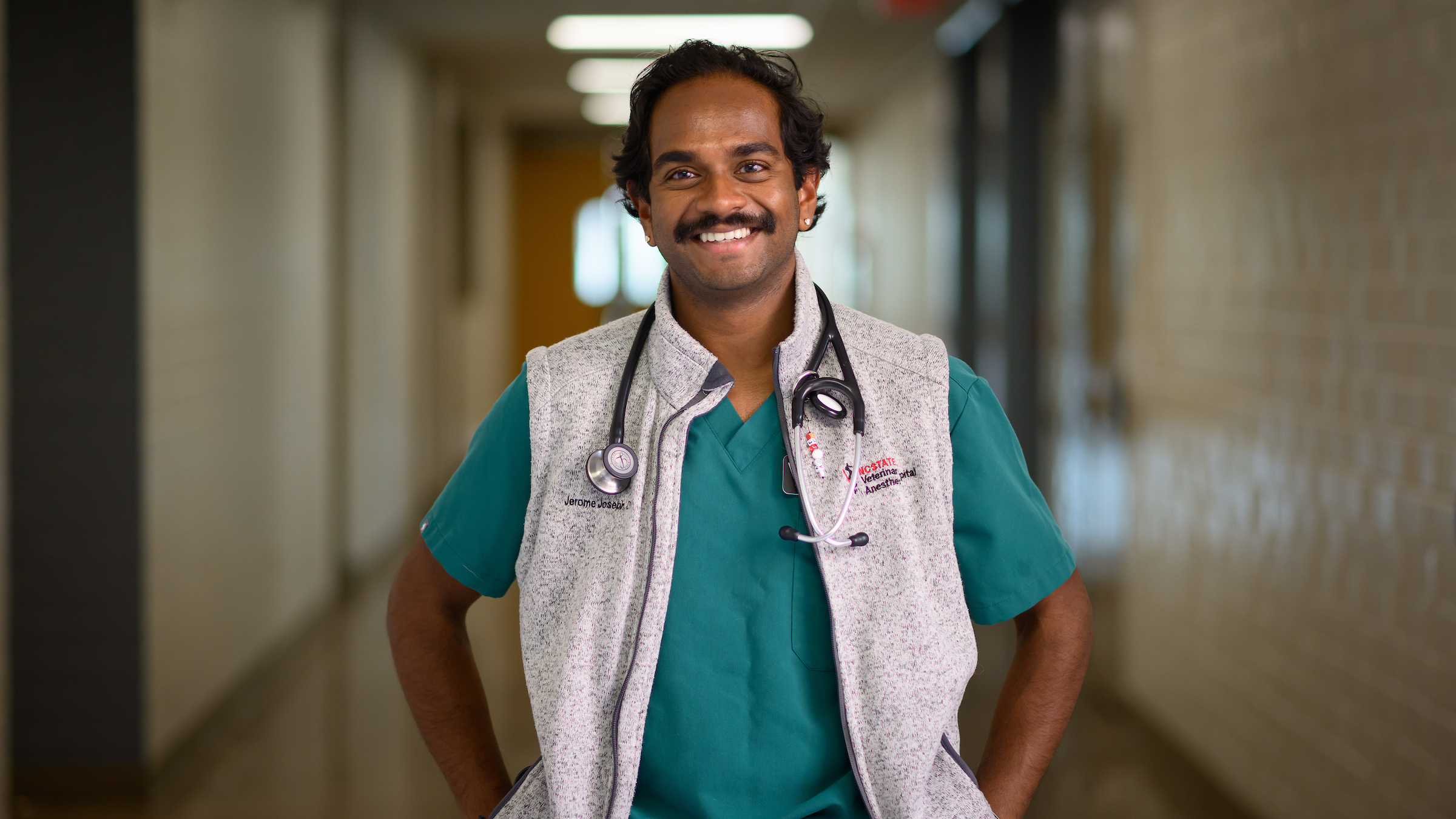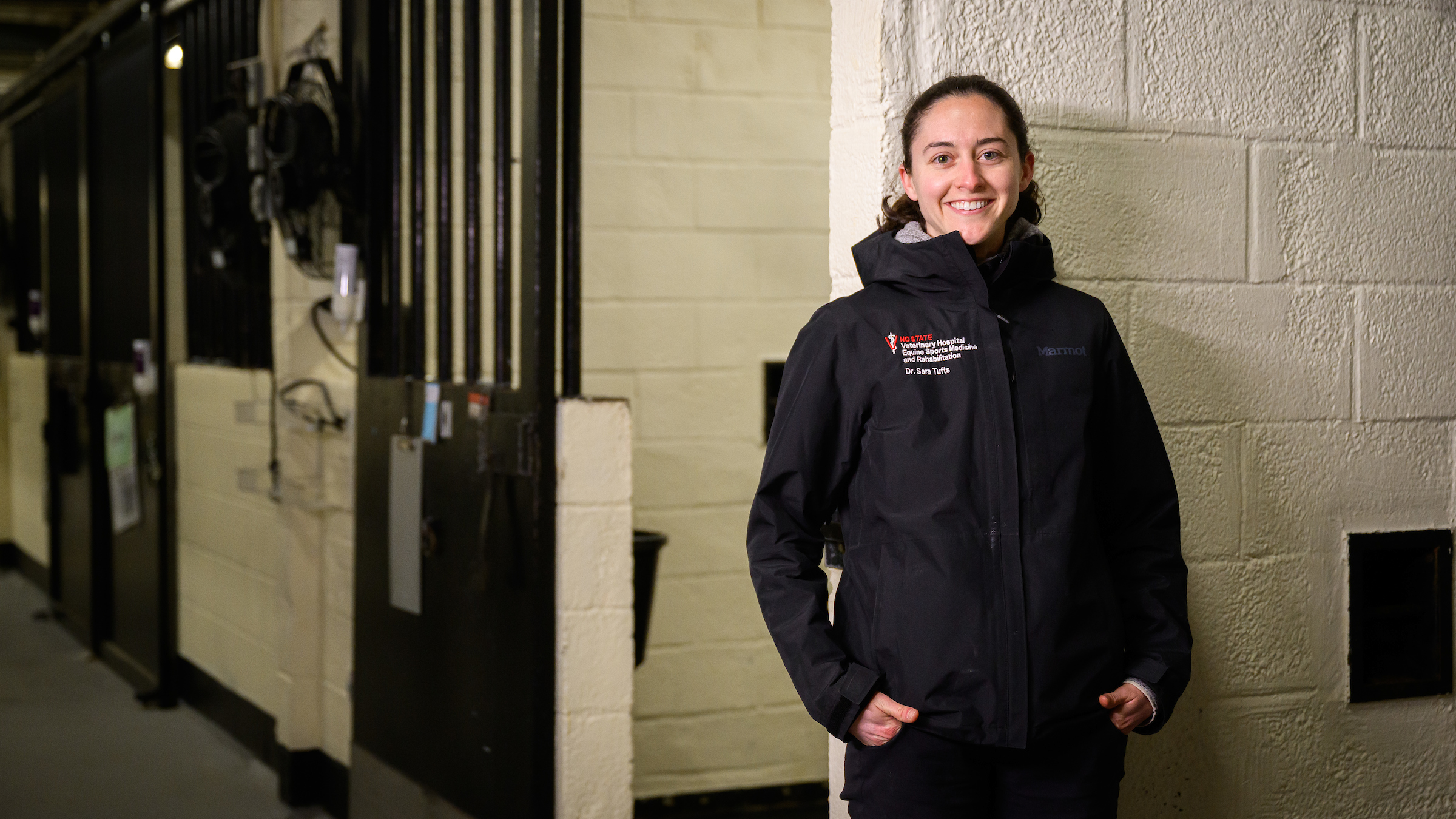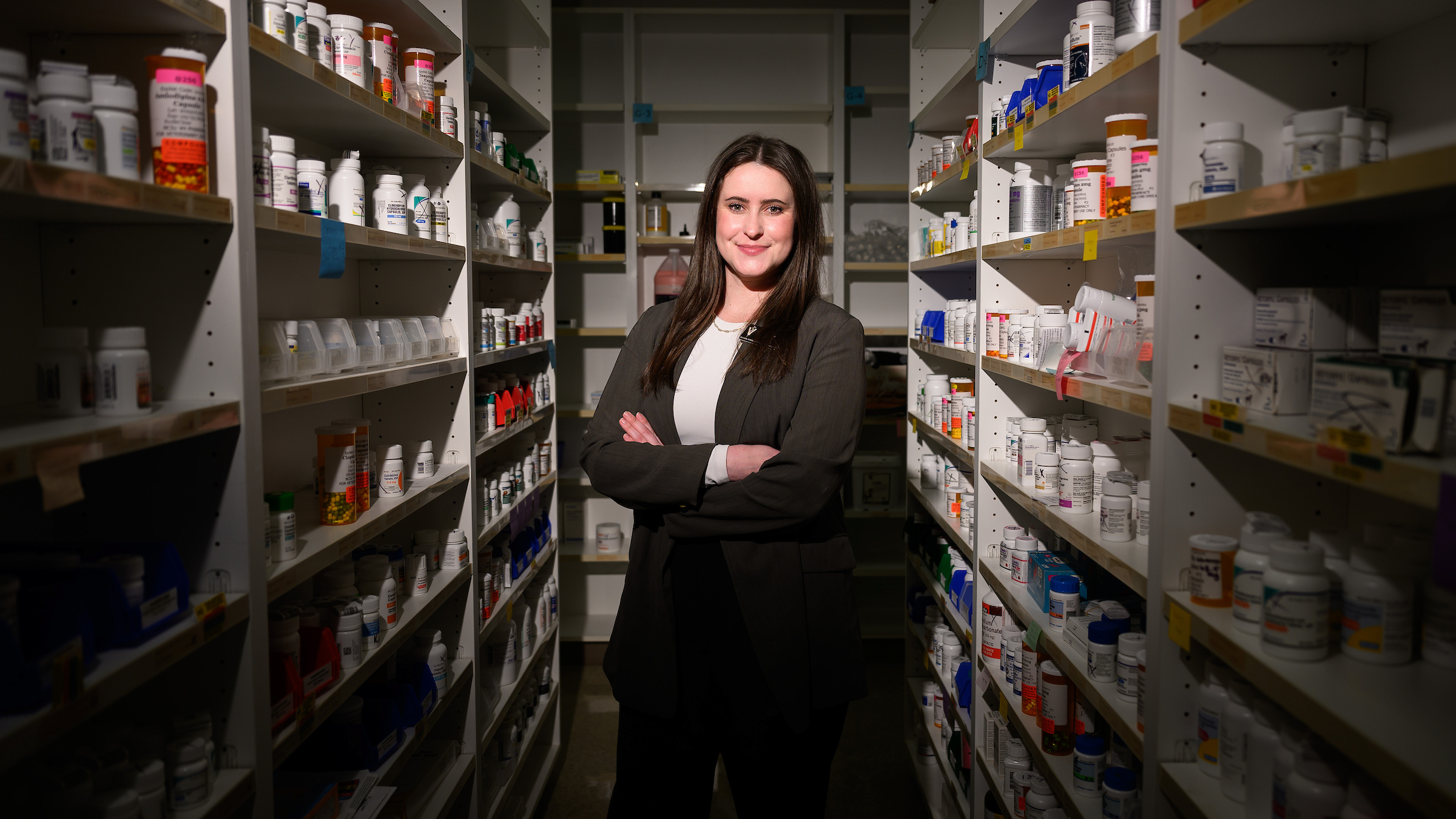House Officer Highlight: Incisive NC State Residency Trains the Specialists Who Treat Canines, Fangs and Tusks
Dental health is whole-body health, says Dr. Maria Dolores “Loli” Porcel Sánchez, a second-year resident in NC State’s veterinary dentistry and oral surgery program.
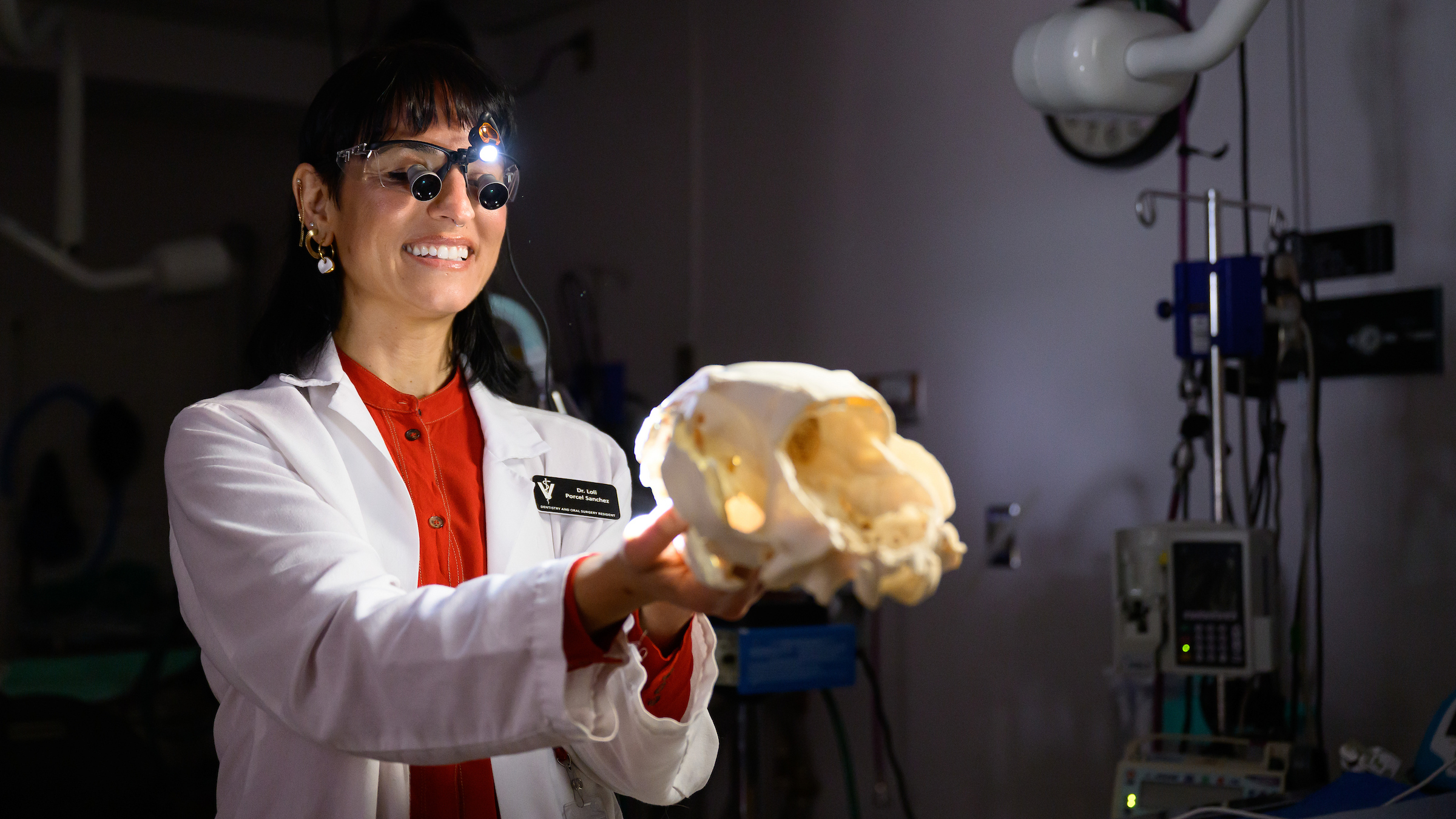
When thinking about important tools for maintaining their pet’s health, many owners wouldn’t picture a toothbrush — yet caring for our animals’ mouths and teeth is one of the most important ways we can safeguard their overall well-being.
“Imagine spending 14 years of our lives without deep brushing or any oral care,” says Dr. Maria Dolores “Loli” Porcel Sánchez, a dentistry and oral surgery resident at the NC State Veterinary Hospital. “It’s almost a guarantee that we’d need to extract most teeth. Owners need to translate that mindset to their pets.”
As Porcel Sánchez explains to fourth-year College of Veterinary Medicine students completing their dentistry rotations, an estimated 85 to 90% of pets seen for dental consultations have symptoms of mild to severe periodontal disease. Identifying oral health issues early is key to improving pets’ prognoses and quality of life, especially since severe periodontal disease has been linked to systemic inflammation and the worsening of chronic issues including heart disease and diabetes.
“All pets are food-motivated, and they are teachable overall to do home oral care,” Porcel Sánchez says. “It’s extremely important for not only keeping teeth in the mouth, but also for systemic health. Happy teeth, happy and healthy body.”
Regular oral health exams and detailed cleanings with a veterinary dentistry specialist can take care of the tartar and gunk pet owners can’t reach and allow screening for more insidious conditions, like oral cancers. In North Carolina, the NC State College of Veterinary Medicine offers comprehensive dentistry and oral surgery services to animals while training new specialists in this established and growing specialty.
Porcel Sánchez, a second-year resident at the NC State College of Veterinary Medicine, is one such trainee who has made it her mission to improve animals’ oral health and advocate dental stewardship in the veterinary field.
Her duties extend far beyond cleaning teeth. Porcel Sánchez spends much of her time in oral surgery, operating to correct traumatic, maxillofacial or oncologic issues of the jaw and mouth. When she doesn’t have a probe, scaler or drill in hand, she’s encouraging students to find meaning in molars and gumption in gums.
“For us at NC State, it’s a mission to educate the new generations,” says Porcel Sánchez, who aspires to work in academia. “And I feel that mission myself, because I love teaching. For me, it’s very important to make sure the students are well-trained in dentistry and have this knowledge in their practice, because they’re going to really need this for all their patients.”
Persistence Pays Off
Raised by a self-professed “crazy cat lady,” Porcel Sánchez was encouraged to have a soft heart for animals in need. She recalls frequently toting cats, birds and turtles home with her in Mallorca, Spain, and professing to her mom at age 7 that she wanted to become a veterinarian “like Dr. Dolittle” and eat a vegan diet.
She also loved any and every hands-on, detailed creative activity, which would later translate to a knack for surgery.
Porcel Sánchez, who speaks English, Spanish, French, the Mallorquín dialect of Catalán and a little Italian, earned the equivalent of her bachelor’s degree from IES Calvià in Calvià, Mallorca, and went on to study veterinary medicine at the Universidad CEU Cardenal Herrera in Valencia, Spain. At the latter, her path serendipitously crossed with future NC State co-residents Dr. Mickaёl Pinto and Dr. Javier Pérez Quesada.
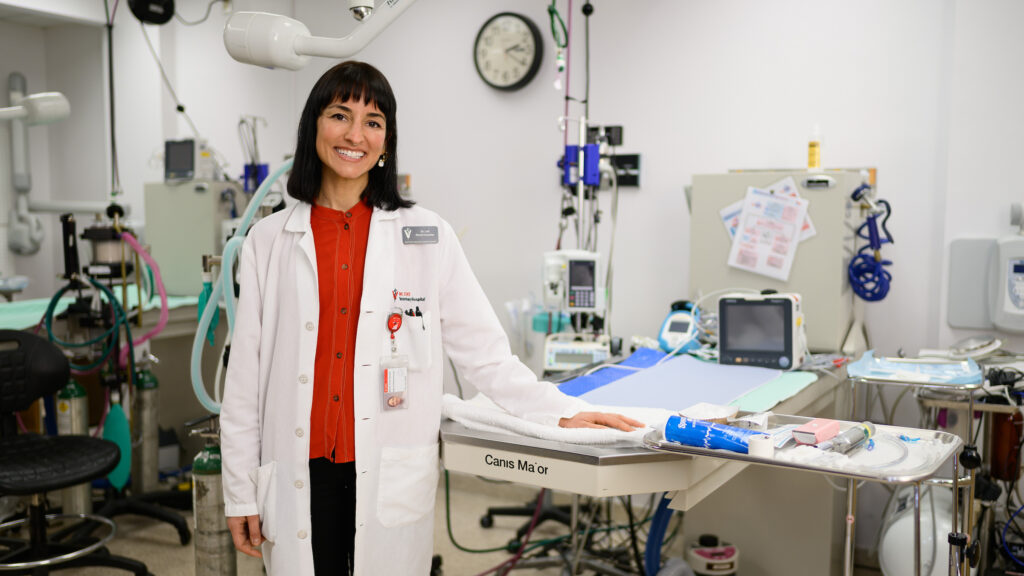
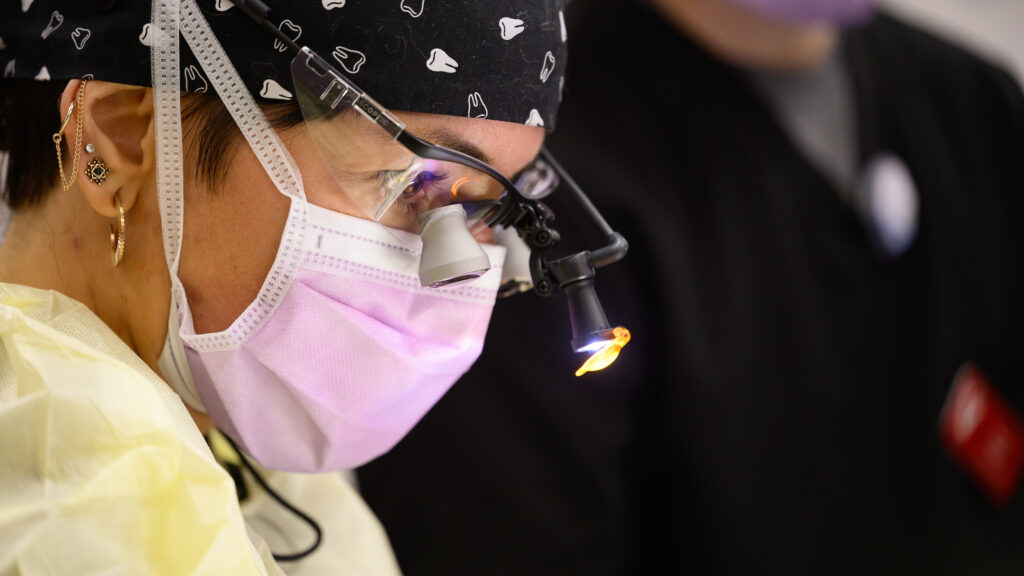
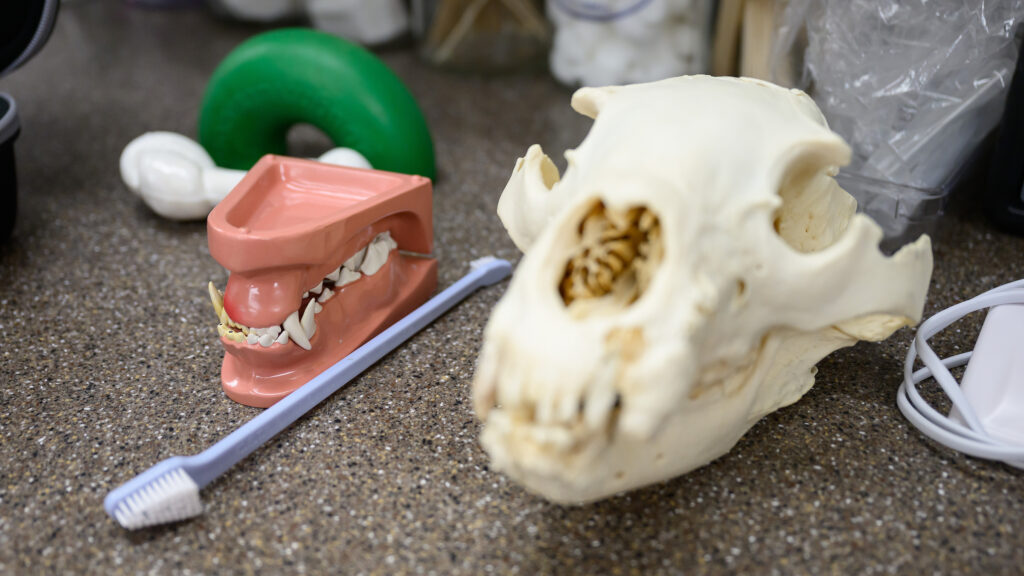
Porcel Sánchez discovered that she was interested in traumatic surgery, specifically orthopedic surgery, during the second year of her veterinary program. Shortly before graduating in 2015, she completed a three-month externship at a Blue Pearl specialty hospital in Chesapeake, Virginia, with Dr. Juan Marti Herrero. That experience sparked a desire to work in the U.S. long-term.
“For me, it was clear very early that I wanted to become a professor at a university and I wanted to be a researcher,” she says. “I wanted to find the best opportunities to reach those goals, and the U.S. offers better opportunities for that pathway than some parts of Europe.”
But before she would make it back stateside, Porcel Sánchez completed a rotating internship at the Frégis veterinary hospital outside Paris and a surgical internship at the Clinique Vétérinaire Alliance in Bordeaux, France. She also worked as a general practitioner in the U.K for a year.
She became a research associate at the Michigan State University College of Veterinary Medicine under mentor Dr. Loïc Déjardin in 2019. There, she worked to improve minimally invasive orthopedic surgery techniques and collaborated on projects supported by the Department of Defense.
In 2020, she matched into a rotating internship at the University of Guelph’s Ontario Veterinary College in Canada. Afterward, completed a surgical internship at the Université de Montréal in Quebec, where she met surgery mentor Dr. Mila Freire.
“During all my internship rotations, I always had contact with the maxillofacial and dentistry specialty,” she says.
Still seeking a surgical residency in the U.S., Porcel Sánchez started corresponding with Dr. Duncan Lascelles, director of the Comparative Pain Research and Education Centre at the NC State College of Veterinary Medicine, and became a clinical research intern there in 2022. Mitigating and preventing pain are important lessons for a future surgeon.
In 2023, her dream finally came true when NC State’s dentistry and oral surgery service recruited her for its training program.
Cutting Her Teeth
On an average week, Porcel Sánchez alternates between two days each seeing patients in clinics and surgery. She spends her Fridays holding dentistry labs for fourth-year students and working on her research project, a retrospective study evaluating the use of cone beam CT imaging in analyzing a canine tooth’s root in a domestic dog with a complicated crown fracture.
What people find surprising about her work, she says, is that veterinary dentists and oral surgeons offer most of the same services as their counterparts in human medicine. Regardless of species, oral surgeons share the goal of saving teeth and avoiding extractions if possible.
NC State’s service sees primarily small animals like dogs and cats but occasionally welcomes exotic patients like squirrels, lions, otters and chimpanzees. Treating such a wide swath of the animal kingdom isn’t as daunting as it may seem, says Porcel Sánchez.
“We start with diagnostic imaging, because different species have different nomenclatures for their teeth and a different number of roots for each tooth in each location,” she says. “Based on the imaging and what we know from literature, we jump into the procedure. Everybody has a mouth, so we just adapt ourselves to the different configurations.”
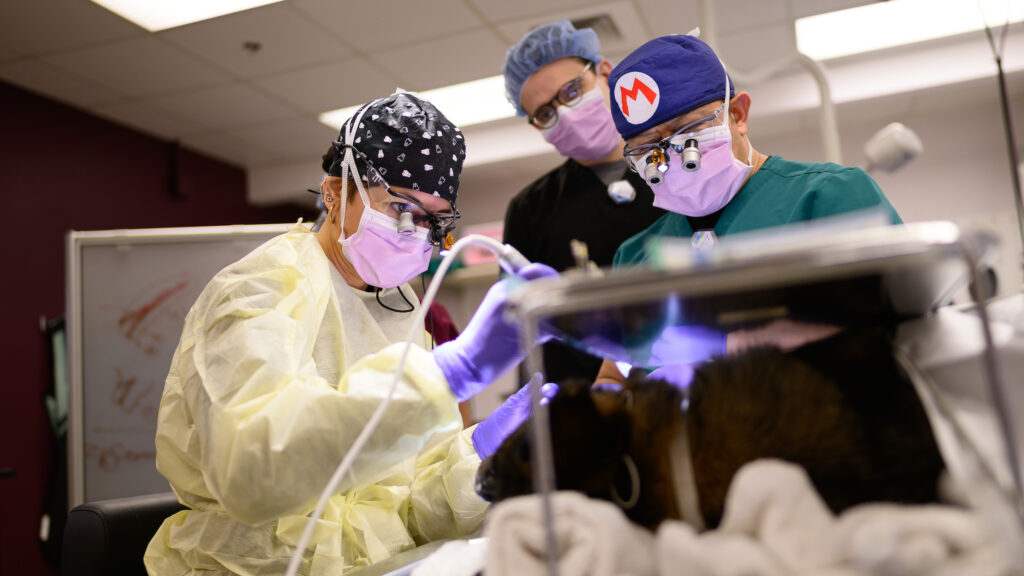
Dr. Lenin Villamizar-Martinez, head of NC State’s dentistry and oral surgery service, says Porcel Sánchez established herself as a valued member of the team from the beginning.
“She is collaborative and enthusiastic, consistently fostering a positive and supportive environment for our team, hospital staff, and clients,” he says. “Together with her co-resident, Dr. Tim Lin, Dr. Porcel has played an important role in the continued growth and development of the residency program.”
When not practicing medicine, Porcel Sánchez is practicing music as the singer of a band composed of other Veterinary Hospital residents and aptly called The Painkillers. Finding such a supportive community of peers and mentors at NC State has been a blessing, especially as an international trainee far from home.
“I’ve learned every single day since coming to NC State,” she says, “and I’m becoming my best version of myself.”
